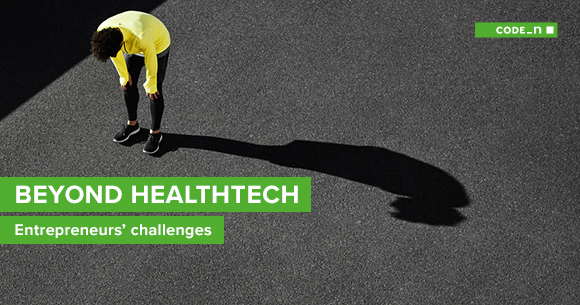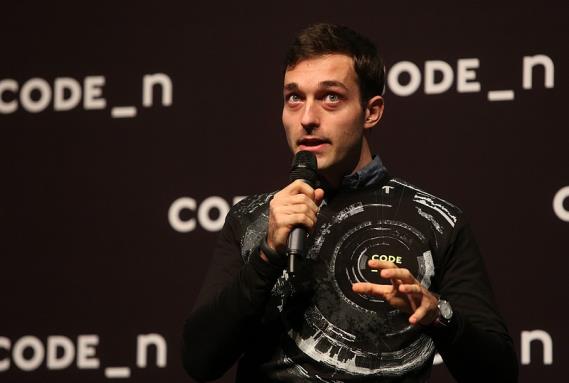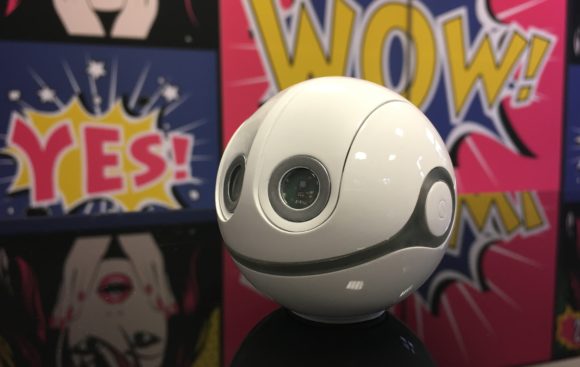The healthtech revolution is gaining ground! But how are entrepreneurs protecting their own health?
In a recent interview with Tobias Günther, we explored the topic of work-life balance and how he has handled stress while starting up his own company. When asked whether the founder of a startup is even able to strike a healthy balance between work and other aspects of life, he answered, “You definitely can. And, maybe more importantly: you have to! The alternative of constantly overstraining yourself is simply not sustainable.” On the other side of this equation you’ll find ambitious entrepreneurs in the fields of medicine and healthtech working to keep improving human health in a wide range of areas. Their inventions are making a contribution toward empowering people to lead healthy lives that are worth living. We recently reported on monikit, the team planning to launch the first smartwatch for epileptics in 2020. BABYBE medical is working on a high-tech cushion that supports the development of premature babies in incubators.
But how do entrepreneurs actually take care of their own health in the high-pressure environment of a startup? And what does healthtech have to offer a group that has been shown to carry a very high stress load? We decided to get to the bottom of these questions and went looking for answers among the healthtech startups that are part of our network. Feedback from Soma Analytics, AmbiGate, and SimyLife helped us paint a better picture of the state of healthtech and entrepreneurship.

Investment firm BGF Ventures teamed up with market research firm Streetbees to survey 500 founders across the UK. Their findings confirm that over 40 percent of the entrepreneurs feel stressed every day. As business magnate Richard Branson stated in the Guardian, “I can’t count the number of stressful situations I’ve found myself in since I launched my first business over 50 years ago.” It has been shown that entrepreneurs are subject to high and continuous levels of stress. How do they handle this situation?
Caroline Dabels, co-founder of CODE_n Alumnus AmbiGate, and her team have launched eReha – a 3D sensor-based movement therapy system aimed at alleviating back pain. Click here to find out more about this innovative motion-sensing technique being developed by the spinoff from Tubingen. Although she experiences the stressful environment of a startup as largely positive, as the founder of a healthtech startup Caroline is also aware of how these challenges could impact on her own health.
“Of course founding a company is very stressful. You have to deal with problems and tasks you’ve never experienced before. There is no hand to protect you, which makes it even more exciting. The most challenging part of founding a company is your work-life balance; even if it feels like the company is your life and there’s no time for anything else, you have to relax and think about other things from time to time. If you don’t, it will come back to haunt you – and it’s easy to burn out. So it’s helpful and necessary to make time for family and friends.”
Tech founder Tobias Günther has also developed strategies to help himself deal with his heavy workload. As an entrepreneur, his inbox is always full, and at the same time he faces the temptations of cool new ideas and business ideas he could pursue. “I try to keep a very a strict schedule. I rarely work after 5 pm – and I never work in the evenings or on the weekends (anymore). I try to finish each workday with a small dose of exercise or simply a walk around the block. This lets my brain know that we’re done for today.” Click here to read the complete interview with Tobias.
A report by Forbes backs up the experiences reported by Caroline and Tobias. The magazine asked 24 entrepreneurs to share their advice for getting a handle on an intensive workload. The best actionable advice was to schedule time not only for work, but also for family and leisure.
Soma Analytics startup offers a resilience program for employees
Alumnus Soma Analytics (CODE_n14 CONTEST), one of Europe’s most renowned digital health and wellbeing startups, was awarded €1.8 million in funding by the EU in October 2016. Having recognized the importance of the mental health of employees, the team has developed their Keela mental resilience program to offer support in this area. Currently they are focusing on the employees of large corporations. As CEO and co-founder Johann Huber explains,
“The program is like a personal performance coach and psychologist. It gives you personalized tips and feedback to increase your resilience, sleep better, be more focused, be happier, and get through stressful periods. We have seen a sharp improvement in our users’ quality of sleep, motivation, energy, and resilience levels and that makes both employees and employers happy.”

Johann Huber gives his all: In 2014, the healthtech startup Soma Analytics delivered its pitch on the CODE_n14 CONTEST stage at CeBIT
Johann believes that the main trends in the healthcare market are personalization, digitalization, and prevention.
“More people will receive better treatment for less, and fewer people will need treatment for preventable behavioral conditions. We want to be part of this trend and shape the future of work.”
New treatment methods made possible by digital health innovations
As Caroline of AmbiGate sees it, “The market will grow even faster and digital health will bring advantages for all users. The technical possibilities we have now can make the transfer of any kind of information quicker, more detailed, and more sustainable. We believe that the new products on the health market have the potential to serve as disruptors without destroying jobs. Instead, it will be about interaction and enhancing treatment methods.”
Caroline adds that although there are a growing number of healthcare apps, the convenience can come at the price of helpful feedback. “And then you don’t know if you’re doing things correctly.” AmbiGate claims that the virtual coach provided in their eReha system solves this problem. It not only shows the exercises on the screen, but also has “eyes” – a 3D camera that tracks all movements and software that allows incorrect movements to be detected in real time.
new.New Festival 2016: Caroline Dabels, co-founder of AmbiGate, represents the team that developed eReha, a digital health solution to assist people suffering from back pain
Another healthtech startup creating innovations in this field is SimyLife. Until recently, Marcel Aberle was pouring his energy into his role as co-founder of CODE_n Alumnus INS Insider Navigation Systems. Now he has shifted his focus to a new digital health startup idea. When we talked to him, he shared some alarming facts:
“As people are becoming more health-conscious, they are structuring their days so they get more exercise. But at the same time, the number of stress-related illnesses is increasing dramatically. This results in annual costs of €240 billion in the European Union alone. Studies show that the usual methods for preventing stress are time-consuming and expensive, and it’s difficult to motivate people to keep using them in the long run.”
The SimyLife team is aiming to change this by, as they put it, digitalizing mental techniques and mental-health coaching. They use cutting-edge technologies such as wearables and methods such as gamification to give people a completely new way to approach the topics of stress prevention and mental techniques. The team plans to market an anti-stress ball, called the SimyBall, which employs sensors (pulse, skin conductance, skin temperature) to provide real-time personalized color feedback on your current stress level. Combined with coordinated games, it can help you measure and train your ability to relax. The team is planning a Kickstarter campaign, which will kick off in November, to launch the SimyBall in the second quarter of 2018.

The SimyBall has 11 sensors to measure pulse, skin conductance, and skin temperature; its color display gives feedback on the user’s stress level
Entrepreneurs – High stress levels, but beyond the focus of our healthtech startups
Although startup founders have higher stress levels than ordinary employees, entrepreneurs don’t seem to be a primary target group for the healthcare startups we talked to. As Johann Huber notes,
“Currently, we are focusing exclusively on large corporate clients because this allows us to reach the greatest number of employees. But it is not set in stone that we won’t widen our focus to include smaller companies in the near future.”
AmbiGate is also not focusing on this target group at present. Like Johann, Caroline confirms that their initial focus is on large companies. One of the reasons is that healthcare is already a well-established topic at major corporations.
“Of course, startups can be customers, too. But most of the time there isn’t much money and a healthy workplace is something that unfortunately is given low priority,” Caroline explains.
Marcel of SimyLife at least sees entrepreneurs as a potential target group for the SimyBall. He also has some advice for his fellow startup founders:
“Pay more attention to your body and take more breaks. Learn mental techniques to improve your tolerance for stress and boost your productivity levels. There are a lot of simple methods out there that are easy to fit into your daily routine. And if you buy a SimyBall, it will all be fun and games.”
We’ll keep you posted on further developments in this area.






Write a comment